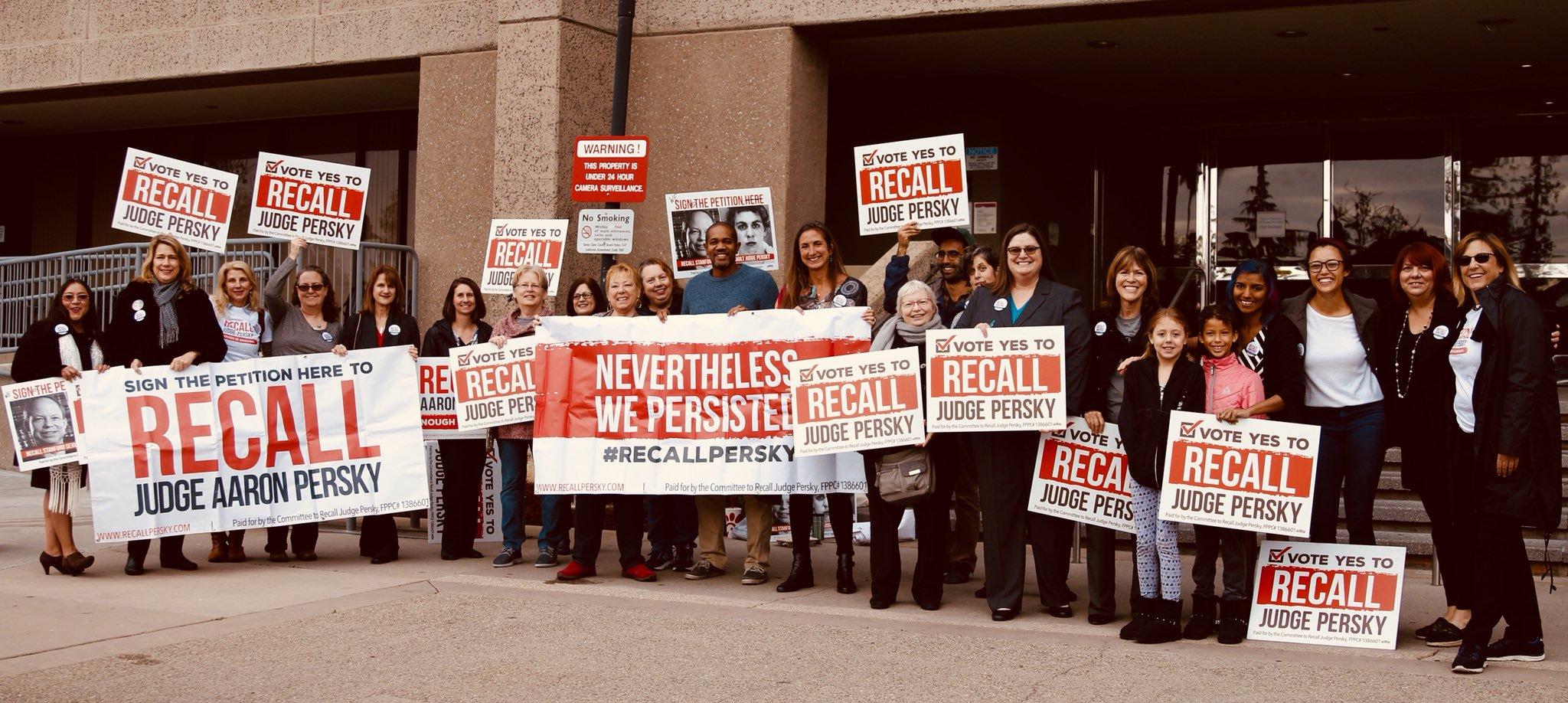Santa Clara County Public Defender Explains What Judge Persky’s Recall Means For His Clients
The judge who sentenced Brock Turner brought much-needed compassion to the bench, says public defender Sajid Khan.

Santa Clara County Superior Court Judge Aaron Persky was recalled from the bench Tuesday over the controversial 2016 case of Brock Turner, a 21-year-old Stanford student convicted of three counts of sexual assault. Turner’s sentence of six months in jail was widely denounced as too lenient. Critics accused Persky of failing to take sexual assault cases seriously—and of giving Turner preferential treatment as a white, affluent college athlete.
Some victims’ advocates hailed the recall as a victory against rape culture. But both local prosecutors and public defenders argued the move was a blow to judicial independence and sentencing reform.
“When judges believe that they will lose their careers for making unpopular but lawful decisions, they may lack the courage to stand up for the rights of minorities or others needing protection from powerful majorities or those with even understandably inflamed passions,” said Santa Clara County District Attorney Jeff Rosen.

Sajid Khan, a Santa Clara County public defender who’s been an outspoken opponent of the recall, spoke to The Appeal about the potential fallout from Persky’s ousting. His interview has been edited for length and clarity.
In a blog post about this recall, you said “we lost a fair, thoughtful, compassionate jurist.” That seems to go against the broader public’s perception, in light of the Brock Turner sentencing. What do you mean by “compassionate”?
Judge Persky looked at Brock Turner for more than just the crime that he was convicted of. He looked at his past, his youth, his prospects of rehabilitation, his prospects for redemption. So when I use the word “compassion,” what I mean by that is that he looked at the humanity of Brock Turner in a broad sense, as opposed to just looking at what crime he committed and what he was convicted for. And that’s so often missing in our criminal justice system. As a public defender, we so often see the humanity of our clients ignored by prosecutors and ignored by judges. There’s a lack of compassion that occurs so often in our system. And so when I see a judge look at the humanity of someone like Brock Turner or of others that appear in his courtroom, it’s refreshing, and I think our system benefits from more of [that] rather than less.
So in your view, the Turner sentencing wasn’t too lenient.
No, I thought it was a reasonable sentence. That’s the thing: The recall proponents put out, on every one of their fliers or ads, “Persky sentenced Brock Turner to just six months in county jail,” which is completely a misrepresentation.
What’s left out in every one of those ads is the fact that he was sentenced to three years of felony formal probation, which means that he’s going to be supervised for three years by a probation officer. He has to check in, he has limitations in terms of where he can live, where he can travel. He’ll have to participate in counseling as directed by the probation department. He has to obey all laws, and if he doesn’t comply with his probation, then he can be sentenced to prison for up to that 14-year maximum that was hanging over his head, in addition to the fact that Turner has to register as a sex offender for the rest of his life, no matter where he lives, whether it’s California or any other state. And if he fails to register even once, he could be subject to a felony prison charge and additional prison time. He’s subject to California’s three-strikes law, meaning that if he commits future felony crimes, he will have the penalty for those crimes increased as a result for the conviction on these offenses. This idea that it was too lenient is completely beyond my comprehension.
“We so often see the humanity of our clients ignored by prosecutors and ignored by judges. There’s a lack of compassion that occurs so often in our system.”
In addition to that fact, we have to ask ourselves: what purpose does more incarceration time serve in a particular case? Let’s just say advocates would have been satisfied if Turner had been sentenced to two years, or six years of prison as opposed to six months in county jail, or one year in county jail as opposed to six months. Beyond just vengeance, and beyond retribution, what purpose or benefit beyond jail time does that sentence actually serve the particular offender, or the victim, or the community? My perspective is that that additional jail time, absent evidence that that jail time is going to somehow help rehabilitate the offender…it’s just retribution and nothing more, and I don’t think our system benefits from that. In fact, many people would argue that that additional time for Brock Turner or someone else in that situation would have made him more of a threat to the community in terms of traumatizing him further, exacerbating any sort of mental health or any other conditions that he might be suffering from. And these exact arguments are exactly what I’d be arguing for for a client of mine.
A major criticism of the recall itself is the worry that rather than pushing for fairer sentences, we are now just pushing for greater sentences for everyone. Do you feel that a fear of possible recall will make judges more punitive? Are you afraid that this is going to make your job much more difficult?
Oh yeah, it’s already happened. … When we criticize a judge or we subject them to a recall or removal for imposing what is widely considered to be “too lenient” of a sentence, we implicitly and explicitly are sending the message to the bench that we would rather they impose more harsh, punitive sentences rather than err on the side of being more lenient, merciful, or compassionate. Whereas we never see judges being subject to vitriol or recalls or removal for imposing what we as public defenders would consider to be too harsh or too punitive or disproportionate sentences, which we believe are happening every day in our courthouses.
And we’ve seen it anecdotally from other public defenders who are appearing in our courthouse, where we see that judges are seemingly less likely to give lower offers to our clients, and we believe it’s in direct correlation to what happened to Judge Persky. What ultimately will happen is that the people that we represent—people of color, minorities, the disenfranchised, the poor in our communities that make up the people ensnared in our criminal justice system—they’re the ones that are going to bear the cost of this recall, because they’re the ones that are ultimately going to be suffering from higher offers or higher sentences because of an explicit or implicit fear that judges could be subject to vitriol or recall if they’re perceived as being too lenient. My ultimate position is that this recall takes us many steps backwards in terms of our fight against mass incarceration. It actually perpetuates mass incarceration, and really perpetuates the idea that justice equals more jail or prison time. That’s the message that this sends.
“We see that judges are seemingly less likely to give lower offers to our clients, and we believe it’s in direct correlation to what happened to Judge Persky.”
Recall proponents cited a number of other instances in which Persky was allegedly lenient in cases involving sex crimes, or more lenient to white defendants. Do you think he saw a young, well-off white kid, and gave him compassion for that reason?
That would be my concern, too, if there was evidence Brock Turner, as relatively affluent, received more consideration or more compassion as compared to a similarly situated minority or poor client. But I’ve seen no evidence of that. Anecdotally, the colleagues that I work with that have appeared in front of Persky all indicated to me that their clients received similar consideration and understanding. They believed that if a similarly situated minority offender had been convicted of the same crimes Brock Turner was that he would have sentenced that hypothetical minority offender to the same sentence. Neither the recall proponents nor anyone else have been able to point to any specific indication that Brock Turner received some sort of exceptional treatment as opposed to some of the average “public defender clients” that would appear in front of Judge Persky.
There was a case that’s been cited by the recall proponents…this gentleman named Robert Chain, who pled guilty to possession of child pornography and received four days in county jail, and three years’ probation. That was another example of why I use the word “compassion.” Felony child pornography can be punished anywhere from zero days county jail with probation all the way up to three years in prison. There’s a wide range of options that judges have discretion to sentence someone to when they’re accused of that crime. But in our courts, so often the “going rate” for that crime is six months county jail, with felony probation, and they have to register as a sex offender for the rest of their life. When you ask prosecutors or courts, “Why six months? Why not less time?” They just say, “That’s the way we do things.” And it really is devoid of any consideration of the person being convicted, what impact that jail sentence might have on them, what impact other components of the sentence might have on them.
Judge Persky, in that particular case, was willing to buck that trend and say, no, I’m going to give this person the sentence that is appropriate for him and the charges he was been convicted of, as opposed to that one-size-fits-all kind of system of sentencing. That’s emblematic to me of compassion that our system benefits from, and that I would like to see more of for my clients.
In particular, I wrote a blog post comparing the Brock Turner case to the case of someone named Raul Ramirez. This was a case that was initially cited by the recall proponents very often as an example of minorities receiving more harsh sentences than Brock Turner received. But when you dig deeper into that case, we learn that the sentence Persky imposed on Raul Ramirez was agreed upon by the prosecutor, it was based on charges that were different than what Brock Turner was accused of, there were differences in terms of Mr. Ramirez’s age, potentially in terms of his criminal history. And so assigning any sort of impropriety to the judge based on a disparate sentence in two wholly different cases is wholly inappropriate, and is actually very misleading and inflammatory.
And any belief that a similarly situated minority offender would have gotten worse—well, if that’s true, then I would want the same consideration that Brock Turner received afforded to my clients in the future.
I want my clients to receive the same consideration and treatment that Turner received because I think that’s a more equitable system, and I think viewing our clients for their entire humanity as opposed to just their crime is the way our system best operates.
